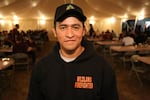
Crew boss Oscar Miranda at at the Taylor Creek Fire incident command post in Merlin.
Emily Cureton / OPB
Oscar Miranda spends about 100 nights a year in a tent.
“Mi casa," he explained. "I have a little cot, so I don’t sleep on the ground."
Miranda has been a wildland firefighter his entire adult life. At 34, he’s the boss of a crew that hikes into forests too steep and dangerous for fire engines to reach. They work with hand tools to dig up burning logs and put out hidden embers. And most of the crew speaks Spanish.
“When I do my briefings, I have to give them bilingual. I know who I can talk to in Spanish, and I know who I can talk to in English,” Miranda said.
His career started around the time the government developed bilingual certifications for crew bosses like him, and training courses in Spanish for the rank-and-file firefighters he supervises.
But two years ago, the National Wildfire Coordinating Group stopped offering course materials in Spanish. It said they were out-of-date, and there wasn’t enough demand to redo the translations.
But leaders from private contractors that fight fires disagree.
“We’re like, 'What the hell. This is a safety issue,'” said Dillon Sanders, president of the Oregon Firefighting Contractors Association.
He said the end of Spanish-language course offerings blindsided them.
“We weren’t notified. We went to order the material and it wasn’t available,” he said.
Sanders said the trade association is preparing to do the translations itself.
And to some firefighting instructors, the materials are essential. Jaime Pickering works for MQ Franco, one of the largest Hispanic-owned contractors in the Northwest. He trains about 500 new firefighters every year, the vast majority speak Spanish as their first language.
“We’re having to resort back to electronics and doing the best we can,” Pickering said.
That means relying on the outdated manuals, and even Google Translate, at a time when wildfires that threaten people's lives and homes are becoming more common in the West.
“The guys, they get the gist of it. But, you know, they’ll laugh and they’ll chuckle, and they’ll be like, ‘You know this actually says...,” Pickering said.
And when it comes to official materials distributed through federal fire agencies, one of the most basic and oft-used texts has never been translated. That’s the Incident Response Pocket Guide. Pickering believes this omission has had real world consequences.
“You’re delaying us a good 10 or 15 minutes out on the line from getting out of a bad situation, while we’re trying to explain to people what’s going on,” he said.
When a fire threatened hundreds of homes recently in Southern Oregon, Miranda’s hand crew drove toward the danger, past a flurry of handmade posters stapled to nearly every utility pole and driveway gate.
Miranda described the scene: “...Que dicen Gracias a firefighters, me hace sentir bien.”
All the signs had the same message for the crew, but delivered in English: "Thank you firefighters."
